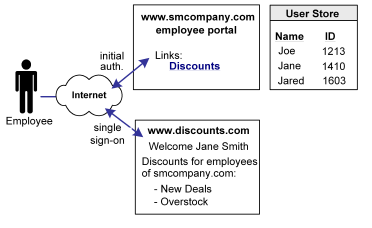In Use Case 3, smcompany.com offers employee discounts by establishing a partnership with discounts.com.
An employee of smcompany.com authenticates at an employee portal at www.smcompany.com and clicks a link to access discounts at discounts.com. The employee is taken to discounts.com's web site and presented with the discounts available for smcompany.com employees, without having to sign on to discounts.com's Web site.
The following illustration shows this use case.

Discounts.com does not maintain any identities for employees of smcompany.com—the company allows all employees of smcompany.com to access discounts.com as long as they have been authenticated at smcompany.com. When an employee of smcompany.com accesses discounts.com, authentication information is sent in a secure manner from smcompany.com to discounts.com. This information is used to allow access to discounts.com.
Additional attributes, such as user name are passed from smcompany.com to discounts.com to personalize the interface for the individual user.
| Copyright © 2011 CA. All rights reserved. | Email CA Technologies about this topic |